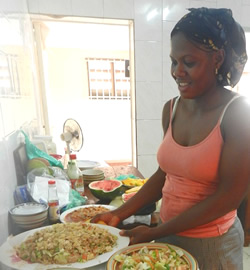By Herb Frazier, special to Charleston Currents | A West African chef, a historian who sleeps where the enslaved slept and a global connector who invites strangers to dinner will create “The Transformation Experience” at Magnolia Plantation and Gardens.
On March 2, the veranda of Magnolia’s main house will be the setting for a dinner to raise awareness that historians, educators and tour guides should not just tell the story of plantation owners. That narrative, however, must also include the influence enslaved Africans had on America’s economy and culture.
Fatmata Bangura Opala, a Sierra Leonean chef who lives near Harrisonburg, Va., will prepare a traditional Sierra Leonean meal. Her husband, historian Joseph Opala, will discuss how Sierra Leone and West Africa’s Rice Coast shaped Gullah Geechee foodways. Gullah Geechee people are the descendants of enslaved West Africans.
After the meal, guests will be encouraged to also spend the night in Magnolia’s former slave cabins with Joseph McGill, founder of the Slave Dwelling Project and a history consultant at Magnolia. Tina Singleton, founder of The Transformation Table, who uses food to create space to foster genuine connections, will help facilitate the event.
“The Transformation Experience” at Magnolia begins at 5:30 p.m. on March 2. Seating is limited. Tickets are $75. To make a dinner reservation visit www.transformationtable.com. To register for the cabin sleep over send an e-mail to McGill at slavedwellingproject@gmail.com. The cabin stay is free.
“The Transformation Experience” is intended to provide a glimpse into the life of the enslaver and the enslaved, McGill said. “The dinner is a comfortable way to engage in a discussion on slavery, but we also want people to go beyond their comfort zone and experience a night in a slave cabin. We want this to be more than a conversation,” he said. “We would prefer that those who come for dinner also spend the night in the cabins, too.”
 Tom Johnson, Magnolia’s executive director, said, “It is very likely this is the first gathering of its kind at a former South Carolina rice plantation. The story of the plantation owners and their enslaved workers is often told separately.
Tom Johnson, Magnolia’s executive director, said, “It is very likely this is the first gathering of its kind at a former South Carolina rice plantation. The story of the plantation owners and their enslaved workers is often told separately.
“We want to tell both sides of American history,” Johnson said. “The history of African Americans is American history that should not be told just in February during Black History Month but every day. At Magnolia we strive to tell that history daily through our award-winning From Slavery to Freedom cabin tour.”
Magnolia was founded in 1676 when South Carolina was an English colony. Holding the “The Transformation Experience” at Magnolia is historically significant because colonial South Carolina has a connection with West Africa’s Rice Coast and Sierra Leone. Slave ship records show that captured West Africans were brought to Ashley Ferry Town on the Ashley River from Sierra Leone and sold into slavery. West Africans were highly prized for their rice-growing skills. The colonial town was near the present-day intersection of Ashley River Road and Bees Ferry Road not far from Magnolia.
- Have a comment? Send to: editor@charlestoncurrents.com




 We Can Do Better, South Carolina!
We Can Do Better, South Carolina!
























